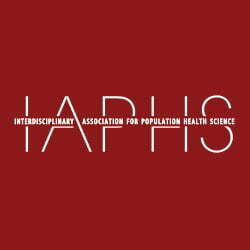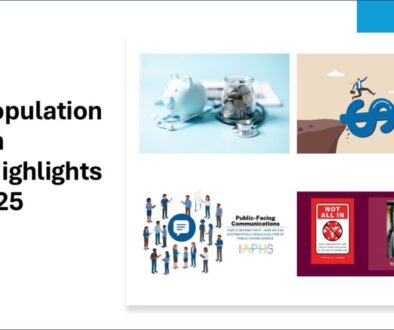Population Health News Roundup: September
IAPHS StaffMembers in the News
 Mark Hayward in JAMA: Life expectancy declined for people with no 4-year college degree, but increased for people with a college education. The difference may be related to drug use. (August 27, 2019)
Mark Hayward in JAMA: Life expectancy declined for people with no 4-year college degree, but increased for people with a college education. The difference may be related to drug use. (August 27, 2019)
Disparities
 Injury investigation disparities in the ER: Black and Hispanic children are more likely than white, non-Hispanic kids to be evaluated and reported for abusive head trauma during an ER visit. (NY Times, August 24, 2019)
Injury investigation disparities in the ER: Black and Hispanic children are more likely than white, non-Hispanic kids to be evaluated and reported for abusive head trauma during an ER visit. (NY Times, August 24, 2019)
Seniors more susceptible to suicide: Various factors are at play, including health issues, bereavement, and loneliness. And when seniors attempt suicide, they’re more likely to die than a younger person is. (NPR, July 27, 2019)
Income disparities in firearm violence: Using the Gini Index, researchers found increased rates of firearm homicides linked to income inequality. (BMJ Injury Prevention Blog, September 5, 2019)
Place
 Building equity in the park: Cities are using data and dollars to create parks to create equity and opportunities to be outdoors. (Governing.com, September 2019)
Building equity in the park: Cities are using data and dollars to create parks to create equity and opportunities to be outdoors. (Governing.com, September 2019)
Rural Utah, guns, and suicide: Most firearm deaths in Utah are suicides, and the rate is higher in rural areas. Easy access to guns, limited access to mental health services, boom-bust economies are factors. Here’s what’s being done to solve the issues. (Kaisher Health News, August 28, 2019)
Gender inequality and intimate partner violence: States with higher levels of gender inequality (defined using maternal mortality, educational attainment, government representation, and other factors) had more women than men reporting psychological intimate partner violence (Public Health Post, September 3, 2019)
Brooklyn gentrification and kids’ health: Gentrification didn’t impact children’s obesity or asthma diagnoses or health care use, but was associated with increased diagnoses of anxiety and depression. (Health Affairs, September 2019)
Post-water contamination has a fallout on Flint kids: Twenty-eight percent of children in the Flint school district have individualized education programs, double the national average. (Education Week, August 26, 2019)
Global Health
 Car-free Barcelona: Almost 700 premature deaths could be prevented every year if Barcelona created car-free superblocks. (The Guardian, September 10, 2019)
Car-free Barcelona: Almost 700 premature deaths could be prevented every year if Barcelona created car-free superblocks. (The Guardian, September 10, 2019)
Snakebites in the Congo: People, especially those in rural areas, are dying of snakebites at a “crisis” rate in the Democratic Republic of the Congo. Lack of infrastructure, anti-venom, and knowledge are are to blame. (Pulitzer Center, June 6, 2019)
Tech Talk
 Paper and smartphones can track the norovirus: Microfluidic chips attach to norovirus particles and can be imaged by a smartphone. (Global Health Newswire, August 27, 2019)
Paper and smartphones can track the norovirus: Microfluidic chips attach to norovirus particles and can be imaged by a smartphone. (Global Health Newswire, August 27, 2019)
The dark side of citizen “narc” apps: Are we headed toward a self-surveillance society? (CityLab, August 28, 2019)
Policy & Programs
 Mayors say no go on SNAP cuts: Over 70 American city mayors plead with the Trump administration to reconsider proposed cuts to food assistance. (NPR, August 22, 2019)
Mayors say no go on SNAP cuts: Over 70 American city mayors plead with the Trump administration to reconsider proposed cuts to food assistance. (NPR, August 22, 2019)
What happened when Oregon changed its Medicaid program?: Sixteen coordinated care organizations (COO) resulted in reduced disparities in primary care visits and access to care, but no change in ER use. (Health Affairs, March 2018)
Pay providers by outcome, not service?: North Carolina is tryingthe fee-for-service approach to instead pay based on outcome. (New York Times, August 26, 2019)
Medicaid expansion linked to fewer evictions: In California, early Medicaid expansion reduced evictions by almost 25 a month in each county. (Health Affairs, September 9, 2019)
Targeting hot spots lowers kids’ hospital rates: At Cincinnati Children’s Hospital, researchers reduced child hospital stays by 20% in two low-income neighborhoods by using real-time health data. Interventions included optimizing chronic disease management and mitigating social risk. (Health Affairs, September 3, 2019)
Public charge rule targets people with disabilities: Disability groups file amicus brief opposing new public charge rule, arguing that it amounts to discrimination against people with disabilities. (Disability Rights Washington, September 10, 2019)





All comments will be reviewed and posted if substantive and of general interest to IAPHS readers.